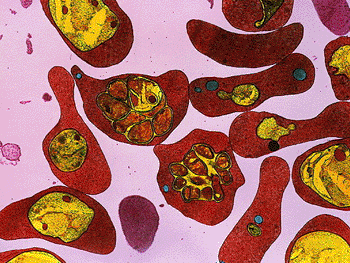Preventing Malaria with Antibodies That Block Formation of Red Cell Rosettes
By LabMedica International staff writers
Posted on 30 Apr 2012
Molecular biologists working on malaria have prepared antibodies that block the activity of a protein common to most Plasmodium falciparum strains that generates the red blood cell rosettes that are responsible for symptoms of the severe illness, including coma and brain damage.Posted on 30 Apr 2012
The PfEMP1 family of variant surface antigens, which are encoded by var genes, are adhesion molecules that play a pivotal role in malaria pathogenesis and clinical disease. PfEMP1 is a major target of protective immunity; however, development of drugs or vaccines based on PfEMP1 is problematic due to extensive sequence diversity within the PfEMP1 family. In the current study, investigators at the University of Edinburgh (United Kingdom) focused on a single manifestation of PfEMP1activity, the ability to generate rosettes (clumps) of red blood cells.

Image: Colored transmission electron micrograph of a section through erythrocytes infected with the malaria parasite (Photo courtesy of Dr. Gopal Murti / SPL).
They reported in the April 19, 2012, online edition of the journal PLoS Pathogens that they were able to generate antibodies against PfeMP1 that blocked rosette formation. The antibodies showed broad cross-reactivity against heterologous parasite strains with the same rosetting phenotype, including clinical isolates from four sub-Saharan African countries.
Senior author Dr. Alexandra Rowe, professor of immunology at the University of Edinburgh, said, “We knew that clusters, or rosettes, of blood cells were found in many cases of severe or life-threatening malaria, so we looked at rosette-forming parasites and found a common factor that we could target with antibodies. We hope this discovery will inform new treatments or vaccines to block the formation of rosettes and so prevent many life-threatening cases of malaria.”
The existence of shared surface epitopes amongst functionally similar disease-associated P. falciparum parasite isolates suggests that development of therapeutic interventions to prevent severe malaria is a realistic goal.
Related Links:
University of Edinburgh













